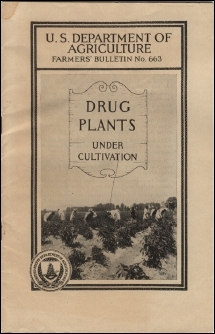WASHINGTON, DC — A federal bill was introduced yesterday that, if passed into law, would remove restrictions on the cultivation of non-psychoactive industrial hemp. The chief sponsors of HR 1866, “The Industrial Hemp Farming Act of 2009,” Representatives Barney Frank (D-MA) and Ron Paul (R-TX), were joined by nine other U.S. House members split equally between Republicans and Democrats.
“It is unfortunate that the federal government has stood in the way of American farmers, including many who are struggling to make ends meet, from competing in the global industrial hemp market,” said Representative Ron Paul during his introduction of the bill yesterday before the U.S. House. “Indeed, the founders of our nation, some of whom grew hemp, would surely find that federal restrictions on farmers growing a safe and profitable crop on their own land are inconsistent with the constitutional guarantee of a limited, restrained federal government. Therefore, I urge my colleagues to stand up for American farmers and co-sponsor the Industrial Hemp Farming Act,” concluded Paul.
“With so much discussion lately in the media about drug policy, it is surprising that the tragedy of American hemp farming hasn’t come up as a ‘no-brainer’ for reform,” says Vote Hemp President, Eric Steenstra. “Hemp is a versatile, environmentally-friendly crop that has not been grown here for over fifty years because of a politicized interpretation of the nation’s drug laws by the Drug Enforcement Administration (DEA). President Obama should direct the DEA to stop confusing industrial hemp with its genetically distinct cousin, marijuana. While the new bill in Congress is a welcome step, the hemp industry is hopeful that President Obama’s administration will prioritize hemp’s benefits to farmers. Jobs would be created overnight, as there are numerous U.S. companies that now have no choice but to import hemp raw materials worth many millions of dollars per year,” adds Steenstra.
U.S. companies that manufacture or sell products made with hemp include Dr. Bronner’s Magic Soaps, a California company who manufactures the number-one-selling natural soap, and FlexForm Technologies, an Indiana company whose natural fiber materials are used in over two million cars on the road today. Hemp food manufacturers, such as French Meadow Bakery, Hempzels, Living Harvest, Nature’s Path and Nutiva, now make their products from Canadian hemp. Although hemp now grows wild across the U.S., a vestige of centuries of hemp farming here, the hemp for these products must be imported. Hemp clothing is made around the world by well-known brands such as Patagonia, Bono’s Edun and Giorgio Armani.
There is strong support among key national organizations for a change in the federal government’s position on hemp. The National Association of State Departments of Agriculture (NASDA) “supports revisions to the federal rules and regulations authorizing commercial production of industrial hemp.” The National Conference of State Legislatures (NCSL) has also passed a pro-hemp resolution.
Numerous individual states have expressed interest in and support for industrial hemp as well. Sixteen states have passed pro-hemp legislation, and eight states (Hawaii, Kentucky, Maine, Maryland, Montana, North Dakota, Vermont and West Virginia) have removed barriers to its production or research. North Dakota has been issuing state licenses to farmers for two years now. The new bill will remove federal barriers and allow laws in these states regulating the growing and processing of hemp to take effect.
“Under the current national drug control policy, industrial hemp can be imported, but it can’t be grown by American farmers,” says Steenstra. “The DEA has taken the Controlled Substances Act’s antiquated definition of marijuana out of context and used it as an excuse to ban industrial hemp farming. The Industrial Hemp Farming Act of 2009 will return us to more rational times when the government regulated marijuana, but allowed farmers to continue raising industrial hemp just as they always had.”
# # #
Vote Hemp is a national non-profit organization dedicated to the acceptance of and a free market for industrial hemp and to changes in current law to allow U.S. farmers to once again grow hemp commercially.
